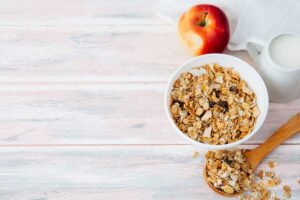|

Soluble fiber
This is the type of fiber that can dissolve in water, forming a gel-like consistency. You’ll find soluble fiber in legumes, oats, peas, nuts, seeds, psyllium husk, and certain fruit and vegetables. (22) Soluble fibers have been shown to improve cholesterol (6) and blood sugar levels. (20)
Insoluble fiber
This is the type of fiber that does not dissolve in water. It provides bulk and softens stools, helping promote digestive regularity. (12) You’ll find insoluble fiber in wheat bran, whole grains, and certain vegetables. (22)
What is the role of fiber in our diet?
Even though we don’t digest fiber, it still plays an important role in our digestion. Fiber is probably best known for helping to relieve constipation. And research confirms what we know intuitively—fiber does make you more regular. (27)
But new research is beginning to reveal that fiber has more varied—and positive—health effects.
We now know that fiber has more far-reaching health effects, lowering the risk of several diseases—and even the risk of dying from any cause. (28) Research also suggests that low fiber intake, common in Western diet patterns, may be associated with a greater risk of inflammation and susceptibility to pathogens. (23)
Certain types of fiber, known as prebiotics, play an important role in overall health by acting as a source of fuel for the beneficial microbes in the digestive system. These microbes—known collectively as the microbiome—play a role in various body functions, including digestion, immunity, metabolism, and neurological function. (23)
Health benefits of fiber
The research is clear and abundant—fiber is good for you. In fact, a database maintained by the International Life Science Institute contains over 1,000 published manuscripts on the health effects of fiber. (10)
Here are just a few areas of health that may benefit from increased fiber in your diet:
- Digestive health
- Heart health
- Metabolic health (18)
Fiber for digestive health
As we’ve noted, fiber plays an important role in digestive health. But it doesn’t just relieve constipation. It can also help with loose stools by absorbing water from the stool and making it bulkier.
Besides, high-fiber diets can help lower the risk of colon problems, including diverticular disease and hemorrhoids. (4)(8)
Fiber for heart health
A diet that’s fueled by ultra-processed foods—which are notoriously low in fiber—is a recipe for cardiovascular disease risk. (19) A high-fiber diet, on the other hand, has been shown to protect the heart. (24)
One of the ways that fiber—especially soluble fiber—helps heart health is by lowering cholesterol. (2) Fiber may also lower blood pressure and curb inflammation. (1)(16) |